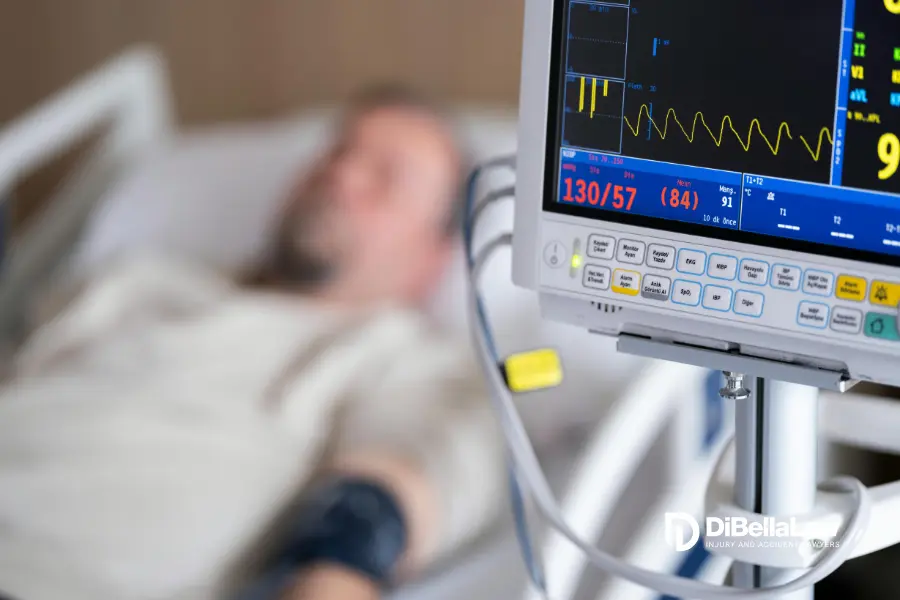The cost of medical care after a car accident can cause enormous financial strain. Massachusetts’ no-fault insurance system is designed to ease that burden by having your own auto insurance policy cover some of your medical expenses, regardless of who was at fault for the crash. Your health insurance and the other driver’s liability insurance may also pay for your medical bills after a car accident in Boston.
Understanding who’s responsible for paying your medical bills can ensure you’re not left on the hook for the expenses of hospital visits, surgeries, medications, and more. When you turn to DiBella Law Injury and Accident Lawyers, we’ll seek full compensation from every available source so you can get the quality care you need.
Initial Medical Bill Payments: Who Pays First?
How your initial medical bills are covered after a car accident in Massachusetts depends on whether you have health insurance.
If you have private health insurance, your personal injury protection coverage, or PIP, pays the first $2,000 in medical expenses. Your health insurance will be responsible for your remaining medical bills.
If you don’t have private health insurance, PIP may cover up to $8,000 in medical expenses. This applies whether you’re uninsured or have public health insurance coverage, such as MassHealth or Medicare.
Understanding Massachusetts’ No-Fault Insurance System
The no-fault insurance system in Massachusetts is designed to reduce delays in medical treatment and limit the number of lawsuits stemming from minor accidents. While PIP might not cover 100% of the medical expenses from an accident, accident victims must first turn to this coverage before other sources.
Massachusetts law requires drivers to carry $8,000 of personal injury protection coverage on their car insurance policies. Each driver’s own PIP insurance pays up to $8,000 of their medical bills and lost wages after an accident, regardless of who was at fault.
How to Obtain Additional Compensation by Proving Fault and Liability
PIP benefits are limited and may not be enough to cover the full cost of your treatment. That’s when additional options for compensation may come into play, such as filing a claim under the at-fault driver’s insurance coverage.
To pursue a claim against another party, you must have incurred at least $2,000 in medical expenses or have suffered a serious injury. To recover damages exceeding your PIP coverage, you must prove that the other driver’s negligence directly caused your injuries.
Building a strong case requires solid evidence of their negligence and your damages, which may include the police report, witness statements, photos of the accident scene, accident footage, medical records documenting your injuries, and expert testimony.
Our firm handles every step of the legal process, including investigating the accident, gathering evidence, calculating your damages, negotiating a fair settlement, litigating your case, and representing you in court if necessary. We work diligently to develop a compelling case within Massachusetts’ personal injury statute of limitations, which is three years from the date of the accident.
Who Is Covered by PIP in Massachusetts?
In Massachusetts, PIP generally follows the vehicle, not the driver. Therefore, anyone in an insured vehicle, including the driver and any passengers, is covered by that vehicle’s PIP insurance. PIP coverage may also extend to pedestrians or bicyclists struck by an insured vehicle.
What Happens When Medical Bills Exceed PIP Coverage?
If your medical bills exceed the PIP limit, you may be eligible to pursue additional compensation through a personal injury claim against the at-fault driver.
Massachusetts law allows you to step outside the no-fault system and file a claim against an at-fault party if your medical bills exceed $2,000 or if you’ve suffered serious injuries such as broken bones, permanent disfigurement, or death. Filing a personal injury claim allows you to seek compensation for damages beyond medical bills, including lost wages and pain and suffering.
The Role of Health Insurance in Medical Bill Payments
Your health insurance may cover medical expenses that exceed your PIP limits. If you have private health insurance in Massachusetts, PIP will cover the first $2,000 of your medical expenses. After that, your health insurer becomes the primary payer for additional treatment.
If you don’t have private health insurance, PIP may cover up to $8,000 of your medical expenses. Public health insurance may pay for additional medical bills, but you have more limited coverage options if you’re uninsured.
Coverage varies based on the details of your health insurance plan. You may need to meet a deductible before your health insurer will pay for your medical expenses, or your plan might require you to pay a co-pay.
In some cases, your health insurer may seek reimbursement from any compensation you receive through a personal injury claim. This process is called subrogation.
How DiBella Law Can Help With Medical Bills After an Accident
Our firm has fought for Boston car accident victims and their families since 2004. We’ve seen the large insurance companies’ tactics first-hand and know how they try to pay victims less than they deserve for their medical bills. Our Boston personal injury lawyers won’t let them take advantage of you.
We have a proven track record of negotiating favorable settlements and reducing medical liens in Boston car accident claims. With offices in Boston and surrounding areas, we’re ready to help you seek the medical care and settlement you deserve.
If you or a loved one has been injured in a motor vehicle crash, contact us today for a free consultation to review your coverage and compensation options.
